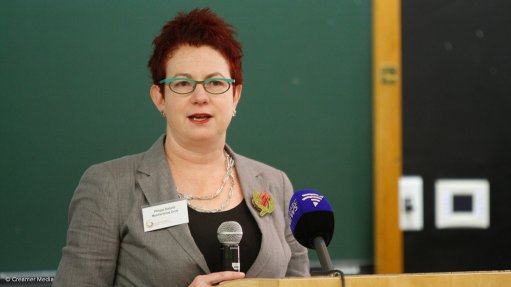
Manufacturing Circle executive director Philippa Rodseth
Photo by: Creamer Media
Despite positive indications, such as seen in various recent Purchasing Manager’s Indices, Manufacturing Circle executive director Philippa Rodseth is urging South Africa to firmly grasp the opportunity presented by Covid-19 in becoming less reliant on global value chains and single-source suppliers.
She explains that, while a lot has happened since Covid-19 arrived on South Africa's shores, it is important to understand the volatility and changes in terms of manufacturing production in the industry.
“Looking back at a later point in time, it may indicate a very difficult time, but we need to understand that manufacturing is very responsive to its environment,” she notes, referring to the decrease and increase in manufacturing production levels as South Africa moves through the various levels of its risk-adjusted lockdown-levels approach to Covid-19.
Rodseth also laments the “significant impact” on the manufacturing space as the industry was impacted by not just the various lockdown levels, but also general demand constraints and lower gross domestic product and global growth.
Gauteng Growth and Development Agency (GGDA) group CEO Mosa Tshabalala says the GGDA, under the Department of Economic Development, implements economic strategies targeting trade and investment in an attempt to alleviate some of the manufacturing sector’s constraints.
She adds that the GGDA also focuses on the promotion of the Gauteng province, and that it facilitates trade through export readiness programmes, management and the development of economic infrastructures, “which is needed for manufacturers to be sustainable”.
To this effect, the GGDA will, over the next five years, launch a multitier special economic zone approach which will “support manufacturing as a province”.
This approach, she says, will be key to ensuring the sustainability of jobs in the manufacturing sector and ensuring that more jobs can be created under the current economic circumstances.
GGDA subsidiaries that support and participate in the approach include the Automotive Industry Development Centre, various innovation hubs and the industrial development zone (IDZ) in the OR Tambo precinct.
“In our SEZ strategy, we provide land, infrastructure development, and it’s all about ensuring that we bring manufacturers and various investors into locations where they can benefit from value chain advantages with each other, as well as skills development, technology transfers and more,” she explains.
More IDZs are being rolled out across each of the five corridors in the province.
“The real purpose [of the strategy] is to provide necessary economic infrastructure and to provide necessary policy and advocacy,” Tshabalala says, noting that support to encourage participation in the space “in a more meaningful way” is critical.
She notes that 55% of goods that are exported from South Africa are manufactured in Gauteng, and that “one in every nine formal jobs” is in the manufacturing space.